1
Obserwuję
mkarwin immersed in print
Once, there were hard-covered, leather-finished tomes. I love those...
Still, I am far more omnivorous reader, incl. of paperbacks & ebooks.
Teraz czytam
EVE: Era Empireum
Metro 2033
Blue Remembered Earth
Ziarna Ziemi (Ogień ludzkości, #1)
Ubuntu Unleashed 2014 Edition: Covering 13.10 and 14.04 (9th Edition)
Mass Effect: Retribution
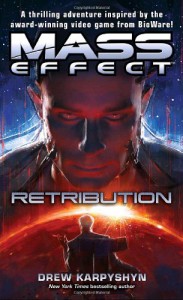 Short of Mass Effect universe and space opera climate, the story is pretty much simple. Gruesome revenge gone bad, the Illusive Man's experiments on Grayson. That Grayson who worked for and than crossed Cerberus to save the daughter not from his flesh, who somehow becomes a mercenary working for an asari Omega station kingpin whilst also having an affair with another one after being indoctrinated by Cerberus for years, and who cared for Sanders after the previous story adventures. As Cerberus finds him and makes him their lab rat, the story begins to unfold. Sanders tries to save him with the help of her friends from the past. Omega kingpin tries to get him thinking he crossed her. In the result, the Illusive Man changes him into the Reapers' technology vessel and, due to the daring rescue attempt, this lab rat gets free to roam the space. The plot gets intertwined with the previous story and games plots a bit as even the enemies start to work together for the common good. The story is heavily based on the game and placed more than a decade after the attack on the central space station, after Cerberus worked with Shepard... Though, better than the first book, possibly slightly better than the second book of the series, some of the plot lines still lacked better conception. On the plus side, it's packed with action, adventures and characters better developped than previous book instalments. Is it good? Not great, but certainly above the acceptable level. Would I suggest it to someone? Maybe only to a ME fan or space opera maniac to introduce him to the ME universe if (s)he declined playing the game series...
Short of Mass Effect universe and space opera climate, the story is pretty much simple. Gruesome revenge gone bad, the Illusive Man's experiments on Grayson. That Grayson who worked for and than crossed Cerberus to save the daughter not from his flesh, who somehow becomes a mercenary working for an asari Omega station kingpin whilst also having an affair with another one after being indoctrinated by Cerberus for years, and who cared for Sanders after the previous story adventures. As Cerberus finds him and makes him their lab rat, the story begins to unfold. Sanders tries to save him with the help of her friends from the past. Omega kingpin tries to get him thinking he crossed her. In the result, the Illusive Man changes him into the Reapers' technology vessel and, due to the daring rescue attempt, this lab rat gets free to roam the space. The plot gets intertwined with the previous story and games plots a bit as even the enemies start to work together for the common good. The story is heavily based on the game and placed more than a decade after the attack on the central space station, after Cerberus worked with Shepard... Though, better than the first book, possibly slightly better than the second book of the series, some of the plot lines still lacked better conception. On the plus side, it's packed with action, adventures and characters better developped than previous book instalments. Is it good? Not great, but certainly above the acceptable level. Would I suggest it to someone? Maybe only to a ME fan or space opera maniac to introduce him to the ME universe if (s)he declined playing the game series...
Mass Effect: Ascension
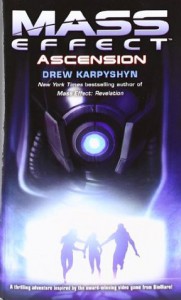 While the #1 in the series was placed somewhere before the ME1 storyline, this is stuck in the middle, right between ME1 & ME2. OK, that's not a bad point. Sure, the Ilusive Man cunning plan keeps the story slightly more engaging, some of the characters from the first book are present (after all, not everyone died during the great battle), but what loses me is how too teenager-oriented explicit relationships are presented... Yes, they're not that obscurely visible as the Twilight saga's, but still more implicit and not obvious connections would make the storyline better. The main character around which the storyline revolves makes for a slightly ill combination of Forrest Gump, Radio and... Starkiller features, all in a young girl's body. Yes, Gillian Grayson is somewhat unique as the whole plot, all the few plotlines, are knotted around her. This makes the book packed with action similarly to the previous installment in the written series. Yes, you meet the aliens of various kinds, some that are more secretive than others. Yes, you have the chance to delve into the universe. Unfortunately though, the story is also, again, too simplistic, too obvious, too apparent for anyone who has read/watched a lot of adventurous/cosmic affairs in one's life. Otherwise, you'll find it an easy read filled with action, interspecies business and placed in the ME macrocosm.
While the #1 in the series was placed somewhere before the ME1 storyline, this is stuck in the middle, right between ME1 & ME2. OK, that's not a bad point. Sure, the Ilusive Man cunning plan keeps the story slightly more engaging, some of the characters from the first book are present (after all, not everyone died during the great battle), but what loses me is how too teenager-oriented explicit relationships are presented... Yes, they're not that obscurely visible as the Twilight saga's, but still more implicit and not obvious connections would make the storyline better. The main character around which the storyline revolves makes for a slightly ill combination of Forrest Gump, Radio and... Starkiller features, all in a young girl's body. Yes, Gillian Grayson is somewhat unique as the whole plot, all the few plotlines, are knotted around her. This makes the book packed with action similarly to the previous installment in the written series. Yes, you meet the aliens of various kinds, some that are more secretive than others. Yes, you have the chance to delve into the universe. Unfortunately though, the story is also, again, too simplistic, too obvious, too apparent for anyone who has read/watched a lot of adventurous/cosmic affairs in one's life. Otherwise, you'll find it an easy read filled with action, interspecies business and placed in the ME macrocosm.
Mass Effect: Revelation
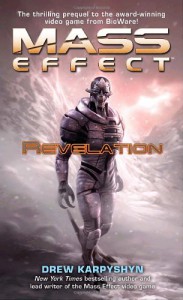 It's an intro to the game's plot... Not much more. However, the book's plot is just too simplistic, almost too single-threaded, the characters build-up is too cliche... For those who haven't played the game, this might be a good start into the ME franchise. For those who played, I'm sorry, but the game is far better. The only good thing about the book is probably how the story is uncovered through several plot lines, or just character viewpoints, converging sooner or later towards the end of the story. Pity, since the game offered far more "complicated" realm. Or maybe it's just me?
It's an intro to the game's plot... Not much more. However, the book's plot is just too simplistic, almost too single-threaded, the characters build-up is too cliche... For those who haven't played the game, this might be a good start into the ME franchise. For those who played, I'm sorry, but the game is far better. The only good thing about the book is probably how the story is uncovered through several plot lines, or just character viewpoints, converging sooner or later towards the end of the story. Pity, since the game offered far more "complicated" realm. Or maybe it's just me?
Linux Quick Fix Notebook (Bruce Perens' Open Source Series)
 Though it might seem exactly like other books of the type, this book is not only very logically arranged, with topics from the basics to most things any admin just needs to know, from single user system config to a server governing the network and users. It also manages to get even a novice from the level of "how to click something out", through where to click and why, to how to do it with a set of simple basic commands. These commands are described in enough detail for the readers, whatever their level of system proficiency, to understand them and their functions. The troubleshooting commands featured in the book are rather straightforward, so any proper admin would only need the book to recall the syntax with optional arguments. Most important log files are also described, though they are not all present in a single chapter, rather the basic system ones in one with others in the respective others. Book is focusing on RPM-based systems (Fedora to be exact), it's quite a refresh after all those debian/*buntu ones. Especially since also Cisco managed network solutions with *nix base are described from the side of linux on those machines. Majority of the book takes care of the network sharing (basically samba/nfs) with interesting troubleshooting and repair part on the firewall actions incl. vpn preparation. Finally, the more advanced part gets into grips with the topics of server preparation, dns, web server setup with mysql, ftp and ssh, and most advanced part on server performance monitoring. The book ends with the topic of server preparation with disk quotas, centralised logins and security technologies/protocols (incl. LDAP and RADIUS) usage on linux servers. Finally, there's an introduction to kernel prepping for performance.
Though it might seem exactly like other books of the type, this book is not only very logically arranged, with topics from the basics to most things any admin just needs to know, from single user system config to a server governing the network and users. It also manages to get even a novice from the level of "how to click something out", through where to click and why, to how to do it with a set of simple basic commands. These commands are described in enough detail for the readers, whatever their level of system proficiency, to understand them and their functions. The troubleshooting commands featured in the book are rather straightforward, so any proper admin would only need the book to recall the syntax with optional arguments. Most important log files are also described, though they are not all present in a single chapter, rather the basic system ones in one with others in the respective others. Book is focusing on RPM-based systems (Fedora to be exact), it's quite a refresh after all those debian/*buntu ones. Especially since also Cisco managed network solutions with *nix base are described from the side of linux on those machines. Majority of the book takes care of the network sharing (basically samba/nfs) with interesting troubleshooting and repair part on the firewall actions incl. vpn preparation. Finally, the more advanced part gets into grips with the topics of server preparation, dns, web server setup with mysql, ftp and ssh, and most advanced part on server performance monitoring. The book ends with the topic of server preparation with disk quotas, centralised logins and security technologies/protocols (incl. LDAP and RADIUS) usage on linux servers. Finally, there's an introduction to kernel prepping for performance.
Artificial Intelligence: Structures and Strategies for Complex Problem Solving
 Though it was already pointed by previous reviewers, this book's main selling point is the amount of knowledge accessible for someone previously not working wit A.I. The information gathered is approaching overly simplified yet really just well laid-out. If you're into the topic and only starting to work with it, it's a great to begin and gather basics plus extended info help-book. It's a jumpstart to the extensive research topics and ideas, yet one must comprehend that time does not simply go by, it flies, and since the book was completed ideas have moved, switched and tested areas previously not considered. If you want to get the grasp of the ideas, sure - it's a good read, if you, however, prefer latest research on the plate i'd rather point you to several conference proceedings instead. And if you rather opt for implementations given on a silver plate, there are books focused on several platforms and programming languages and with A.I. methods given.
Though it was already pointed by previous reviewers, this book's main selling point is the amount of knowledge accessible for someone previously not working wit A.I. The information gathered is approaching overly simplified yet really just well laid-out. If you're into the topic and only starting to work with it, it's a great to begin and gather basics plus extended info help-book. It's a jumpstart to the extensive research topics and ideas, yet one must comprehend that time does not simply go by, it flies, and since the book was completed ideas have moved, switched and tested areas previously not considered. If you want to get the grasp of the ideas, sure - it's a good read, if you, however, prefer latest research on the plate i'd rather point you to several conference proceedings instead. And if you rather opt for implementations given on a silver plate, there are books focused on several platforms and programming languages and with A.I. methods given.
Raspberry Pi Home Automation with Arduino
 If you've got both arduino and raspberry pi, and lots of external boards you might have used or tried to use to get your arduino home system to even better functionality but got bored or distracted it's a good read. You'll use what you have, you'll play with rasp's great interfaces and you'll get back to the topic of "supah home intelligence", as the previous book owner expressed the state after having it read (while giving me this book). And as I love to tinker with some toys and had similar things done at work already it was clear to me that the book might change my work and use more of the rasp's potential. I was right, yet I was also in a comfortable situation of having my "board garbage collection" a little bit slimmer. If you own only a rasp pi you would have needed to procure a few of such external interfaces to finish the basic projects. But if you used rasp pi only as a home network file server/media streamer this migh show you how you can change it into your very own HAL9000 bastard progeny. You might also spend a few bucks in the process, but it's not equivalent to your average lady on a shopping spree shoe/bag/clothes hunt ;) So quite interesting projects, easy to follow instructions and you're off hidden in your workshop for some time.
If you've got both arduino and raspberry pi, and lots of external boards you might have used or tried to use to get your arduino home system to even better functionality but got bored or distracted it's a good read. You'll use what you have, you'll play with rasp's great interfaces and you'll get back to the topic of "supah home intelligence", as the previous book owner expressed the state after having it read (while giving me this book). And as I love to tinker with some toys and had similar things done at work already it was clear to me that the book might change my work and use more of the rasp's potential. I was right, yet I was also in a comfortable situation of having my "board garbage collection" a little bit slimmer. If you own only a rasp pi you would have needed to procure a few of such external interfaces to finish the basic projects. But if you used rasp pi only as a home network file server/media streamer this migh show you how you can change it into your very own HAL9000 bastard progeny. You might also spend a few bucks in the process, but it's not equivalent to your average lady on a shopping spree shoe/bag/clothes hunt ;) So quite interesting projects, easy to follow instructions and you're off hidden in your workshop for some time.
Tea: The Drink That Changed the World
 A short story of how tea was grown, how the types became what they are today and how it evolved due to human intervention. Plus, a simple introduction to how the tea is brewed to keep its original taste intact. Who would like to spend time on it? Maybe total tea freaks... Anyone else will be coming to a stall after a few pages since it doesn't seem to be encouraging those no-tea-just-coffee types to read further. Those who look for a compendium on the history of various teas and herbal brews might consider some other books as I recall a few titles are there just for the pleasure of discovering various tastes, with photos and descriptions how to brew "teas" from all over the world. This just focuses on the man-flora interaction that over time lead to the tasteful liquid in an utensil we now call a cup of tea.
A short story of how tea was grown, how the types became what they are today and how it evolved due to human intervention. Plus, a simple introduction to how the tea is brewed to keep its original taste intact. Who would like to spend time on it? Maybe total tea freaks... Anyone else will be coming to a stall after a few pages since it doesn't seem to be encouraging those no-tea-just-coffee types to read further. Those who look for a compendium on the history of various teas and herbal brews might consider some other books as I recall a few titles are there just for the pleasure of discovering various tastes, with photos and descriptions how to brew "teas" from all over the world. This just focuses on the man-flora interaction that over time lead to the tasteful liquid in an utensil we now call a cup of tea.
Ancient Persia
 Fabulous introduction to the turmoils inside and around the great persian empire. No, it does not spend chapters on breeding the persian cat, instead it focuses on most interesting story how the empire was born and how it has become one of the most powerful force of the times. An interesting read for anyone studying the topic, he would also find the references and bibliography very useful for further studies. Westerns should also take a peek at least, since the book shows how Pershians managed to create multicultural multinational world capable of conquering european 'white power' by the Middle Ages... It sure explores the political and economic ideas used within the lands, presents how fast-forward thinking and inventive the nations were and how it allowed them to develop and expand into major political power between pharaohs in the east and the nile, freezing himalayas and beyond, indian subcontinent and beyond, and finally the later catered european reach in the form of greeks followed by Roman Empires. The book examines certain beliefs and viewpoints introducing one the long debates as well as angles on the reason why the Persians chose to settle down and develop into powerful force of civilisation in a land so close to surrounding sands and how their civilisation might have helped save the western ones from the easterners at the same time improving economy and trade. Sure, it does require of reader to have some knowledge of ancient history but not as much as some university course books do. It is quite informative and with the text easily flowing through pages you do not feel overtly tired of reading them. It does leave you with some questions but it's what a book should do - give information in enough portions for an academic or interested one to find the book's contents useful while restricting and limiting itself for a normal person not to fall asleep by the tenth page. Wiesehofer managed just that, maybe a little too much of academic language is used but it's not a fasion/style weekly for teenagers so this shouldn't be held againt him. What really counts is how fluid the information crammed transfer to the reader is and how much of it is showed through those pupils of his/hers. A really good read for anyone, but not perfect... So when can we expect new edition with even more on the topic?
Fabulous introduction to the turmoils inside and around the great persian empire. No, it does not spend chapters on breeding the persian cat, instead it focuses on most interesting story how the empire was born and how it has become one of the most powerful force of the times. An interesting read for anyone studying the topic, he would also find the references and bibliography very useful for further studies. Westerns should also take a peek at least, since the book shows how Pershians managed to create multicultural multinational world capable of conquering european 'white power' by the Middle Ages... It sure explores the political and economic ideas used within the lands, presents how fast-forward thinking and inventive the nations were and how it allowed them to develop and expand into major political power between pharaohs in the east and the nile, freezing himalayas and beyond, indian subcontinent and beyond, and finally the later catered european reach in the form of greeks followed by Roman Empires. The book examines certain beliefs and viewpoints introducing one the long debates as well as angles on the reason why the Persians chose to settle down and develop into powerful force of civilisation in a land so close to surrounding sands and how their civilisation might have helped save the western ones from the easterners at the same time improving economy and trade. Sure, it does require of reader to have some knowledge of ancient history but not as much as some university course books do. It is quite informative and with the text easily flowing through pages you do not feel overtly tired of reading them. It does leave you with some questions but it's what a book should do - give information in enough portions for an academic or interested one to find the book's contents useful while restricting and limiting itself for a normal person not to fall asleep by the tenth page. Wiesehofer managed just that, maybe a little too much of academic language is used but it's not a fasion/style weekly for teenagers so this shouldn't be held againt him. What really counts is how fluid the information crammed transfer to the reader is and how much of it is showed through those pupils of his/hers. A really good read for anyone, but not perfect... So when can we expect new edition with even more on the topic?
Innumeracy: Mathematical Illiteracy and Its Consequences
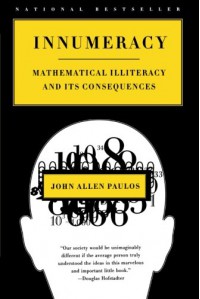 Do you know the old IT/electronics saying that "only intelligent one understand that 1+1 is equal to 10"? Well you might be forgiven for not knowing binary but the problem of illiteracy and especially mathematical type of it is widespread and frankly speaking quite disturbing. Sure, what would a philosophy student need trigonometric functions or logarithmic smoothing of some multi-variable function for you ask yourself and you might be right, yet the problem persists with even more extreme cases and people, whether it's center of the states, europe or australia, can have problems with basic maths. "But it does not concern me!" you say and here's where this book comes in and shows you how very wrong you are. Alright, when you're on a shopping spree and paying with a card that's not so important, but once you get to the coins, change etc. it all starts to be overt. Does it end here? Paulos seems to find even more extreme cases and unearth them for your own reading pleasure and a word of caution... Be it gambling, advertising language, price cuts, the maths has its influence, often very interesting in all of them. With the 'innumeracy' around us, the advert agents can profit with their increased bars on charts, better statistics or almost zero problems answer with the almost stemming from a number you really should understand. They, the puppeteers and other folk, get better money because people either can't read and understand or just plainly do not comprehend the basics of maths. The price reductions of n% for a shopping spree seasons with prices dropped from the original sticker price or one superficially increased just before the discounts basically mean no savings, check the book and you'll find that most cases mean you're paying extra for the adverts and 'how to sell it profitably' collective. People buying dream holidays/homes/objects they cannot afford either financially (and thus the credits come in) or due to time restrictions... Sure, those you pay are happy with the idea of overspending clients and earning extra cash but spending much too much concerns us all. You might think that high school classes were enough... Well you'd still need a bit of college grade knowledge to comprehend all the math presented, though the author tries to put the info forward easily. Believe me and the author when I tell you this after some time with the little-innumeracy afflicted at the university - even those highly educated can be innumeratic, and once this gets to logic and calculus you end up with people who might be responsible for you future but who do not know the difference between 'and' and 'or'. Not to mention 'all' and 'some'. This books discusses the problem with many examples, some rather simple and believable, some however seem really far too fetched even for a news story in a gossipy stand but still taking place according to the author. Once you read it you'll find you really need to conquer those math books you once threw down to the basement and you really need to understand it. The perspective for those who don't is far too severe for anyone to simply sit by and watch what happens. Once you get it, that is by the time you get to the about 50th page, you'll realise that the people around you and people around the world as well need to understand basic math and use it to see how they all are often played by others. Otherwise there will be more than just a tiny grey area of illiteracy, it's going to be a deep rift, wide enough for the inhabitants to hurt you or make you pay the, title mentioned, consequences. Or you might just become a hollywood superstar and have whole support teams you'd pay far too much just to never use your brain cells after contracting them... if you're lucky enough. For others, the book is a good discussion of the problem, of math ruling the world from gambling with casino always winning to black friday sales and the viewpoint is not so addictive as the coffee or tea you'll need to read it over but still worth the time. It's a good word of warning, though the text flow, the language used, the examples presented, it all seems just to similar to other math in the world book offers... The warning innumeracy specific part and its consequences is discussed specifically only in a part of the book, yet by reading it you understand that the whole maths in real life situation throughout the pages is both real and concerning you... It's both showing the applicable laws and allows you to see how many areas of real life are governed by simple mathematical tricks and gimmicks you might have been not very aware of. Is it worth your money? Frankly, I've read a few similar 'math in life' theme books already and it hardly differs not to mention excels at anything. Sure in essence its contents should be known more or less to most men already and the method of information transfer is capable of finding fans, but I'm not one of them. So basically a good read for anyone with an open mind, but if your finances are constricted somewhat you'd be better looking elsewhere.
Do you know the old IT/electronics saying that "only intelligent one understand that 1+1 is equal to 10"? Well you might be forgiven for not knowing binary but the problem of illiteracy and especially mathematical type of it is widespread and frankly speaking quite disturbing. Sure, what would a philosophy student need trigonometric functions or logarithmic smoothing of some multi-variable function for you ask yourself and you might be right, yet the problem persists with even more extreme cases and people, whether it's center of the states, europe or australia, can have problems with basic maths. "But it does not concern me!" you say and here's where this book comes in and shows you how very wrong you are. Alright, when you're on a shopping spree and paying with a card that's not so important, but once you get to the coins, change etc. it all starts to be overt. Does it end here? Paulos seems to find even more extreme cases and unearth them for your own reading pleasure and a word of caution... Be it gambling, advertising language, price cuts, the maths has its influence, often very interesting in all of them. With the 'innumeracy' around us, the advert agents can profit with their increased bars on charts, better statistics or almost zero problems answer with the almost stemming from a number you really should understand. They, the puppeteers and other folk, get better money because people either can't read and understand or just plainly do not comprehend the basics of maths. The price reductions of n% for a shopping spree seasons with prices dropped from the original sticker price or one superficially increased just before the discounts basically mean no savings, check the book and you'll find that most cases mean you're paying extra for the adverts and 'how to sell it profitably' collective. People buying dream holidays/homes/objects they cannot afford either financially (and thus the credits come in) or due to time restrictions... Sure, those you pay are happy with the idea of overspending clients and earning extra cash but spending much too much concerns us all. You might think that high school classes were enough... Well you'd still need a bit of college grade knowledge to comprehend all the math presented, though the author tries to put the info forward easily. Believe me and the author when I tell you this after some time with the little-innumeracy afflicted at the university - even those highly educated can be innumeratic, and once this gets to logic and calculus you end up with people who might be responsible for you future but who do not know the difference between 'and' and 'or'. Not to mention 'all' and 'some'. This books discusses the problem with many examples, some rather simple and believable, some however seem really far too fetched even for a news story in a gossipy stand but still taking place according to the author. Once you read it you'll find you really need to conquer those math books you once threw down to the basement and you really need to understand it. The perspective for those who don't is far too severe for anyone to simply sit by and watch what happens. Once you get it, that is by the time you get to the about 50th page, you'll realise that the people around you and people around the world as well need to understand basic math and use it to see how they all are often played by others. Otherwise there will be more than just a tiny grey area of illiteracy, it's going to be a deep rift, wide enough for the inhabitants to hurt you or make you pay the, title mentioned, consequences. Or you might just become a hollywood superstar and have whole support teams you'd pay far too much just to never use your brain cells after contracting them... if you're lucky enough. For others, the book is a good discussion of the problem, of math ruling the world from gambling with casino always winning to black friday sales and the viewpoint is not so addictive as the coffee or tea you'll need to read it over but still worth the time. It's a good word of warning, though the text flow, the language used, the examples presented, it all seems just to similar to other math in the world book offers... The warning innumeracy specific part and its consequences is discussed specifically only in a part of the book, yet by reading it you understand that the whole maths in real life situation throughout the pages is both real and concerning you... It's both showing the applicable laws and allows you to see how many areas of real life are governed by simple mathematical tricks and gimmicks you might have been not very aware of. Is it worth your money? Frankly, I've read a few similar 'math in life' theme books already and it hardly differs not to mention excels at anything. Sure in essence its contents should be known more or less to most men already and the method of information transfer is capable of finding fans, but I'm not one of them. So basically a good read for anyone with an open mind, but if your finances are constricted somewhat you'd be better looking elsewhere.
Using Open Source Platforms for Business Intelligence: Avoid Pitfalls and Maximize ROI
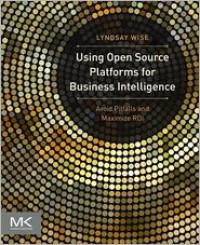 A little too simplistic, a little too easy and general, when being introduced to the topic this book allows for a comprehensive generalisation without any specific technology influences. However, this works only for an introduction and for people not exactly in the IT department where less-management and more solutions are needed. Sure, it works when preparing to show the solutions and ideas to other company members but it just won't cut it for an IT geek among you. At least you can get your boss to get you this book, skim through it and then pass it to him. If it reaches the proper ground, the book might encourage your team-mates and department heads to finally jump onto the open-source or freeware wagon. If you're simply interested in the idea or want to switch from closed apps, it's a good start point. Yet, by the time you get to the 50th page you'll realise how enigmatic and over-generalised the authors' view-point is. But at the same time, you'll already be testing different solutions found thanks to this book's points of interest. As I said - it's just the beginning of the journey, far enough for a non-IT person to comprehense and get hooked, easy enough for non-economics or non-management one to understand the processes and obtain the knowledge of what to look for when discussing the solutions with those non-geeky ones.
A little too simplistic, a little too easy and general, when being introduced to the topic this book allows for a comprehensive generalisation without any specific technology influences. However, this works only for an introduction and for people not exactly in the IT department where less-management and more solutions are needed. Sure, it works when preparing to show the solutions and ideas to other company members but it just won't cut it for an IT geek among you. At least you can get your boss to get you this book, skim through it and then pass it to him. If it reaches the proper ground, the book might encourage your team-mates and department heads to finally jump onto the open-source or freeware wagon. If you're simply interested in the idea or want to switch from closed apps, it's a good start point. Yet, by the time you get to the 50th page you'll realise how enigmatic and over-generalised the authors' view-point is. But at the same time, you'll already be testing different solutions found thanks to this book's points of interest. As I said - it's just the beginning of the journey, far enough for a non-IT person to comprehense and get hooked, easy enough for non-economics or non-management one to understand the processes and obtain the knowledge of what to look for when discussing the solutions with those non-geeky ones.
Ne vremya dlya drakonov
 Though I needed to hunt the meaning of some words in order to understand the story, it still kept me going through the pages. Encompassing a fairly productive universe characteristics, this fantasy story thrives to differ a bit without great results - dragons are here, lands are unpolluted by industrial evolution, the world is kept in a stasis, the magic roams the realms, dwarves are eager to work and break bones of those they do not like, elves as always are gracefully trying to distance themselves from the mere mortal humans and even worse the chubby low-life ;) Again there are powerful "puppet-masters" who control their domains through magic. And who would have suspected this, there is a hero who seems to not want to live a life of a hero but who needs to change and face the powerful opponents and rise to everything that is thrown against him... And you know what? Every hero somehow manages to save his land when compelled ;)
Though I needed to hunt the meaning of some words in order to understand the story, it still kept me going through the pages. Encompassing a fairly productive universe characteristics, this fantasy story thrives to differ a bit without great results - dragons are here, lands are unpolluted by industrial evolution, the world is kept in a stasis, the magic roams the realms, dwarves are eager to work and break bones of those they do not like, elves as always are gracefully trying to distance themselves from the mere mortal humans and even worse the chubby low-life ;) Again there are powerful "puppet-masters" who control their domains through magic. And who would have suspected this, there is a hero who seems to not want to live a life of a hero but who needs to change and face the powerful opponents and rise to everything that is thrown against him... And you know what? Every hero somehow manages to save his land when compelled ;)
Internet Search Engines: Google Search, Archie Search Engine, Wide Area Information Server, Lycos, Citeseer, Inktomi, Bing, Yahoo!
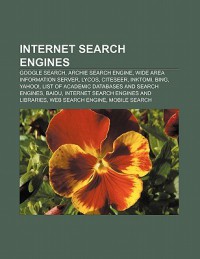 A short but even quite thorough introduction to the world of existing and slowly dying solutions for those who want to dig into the web and master the art of correct use... But of course you could have easily just visited the wikipedia pages or google interesting information around to further your knowledge... Still if your eyes are read, you can't watch the screen anymore or your teacher requires you to put bibliographical notes in the short paper you've just managed or are planning to finish using wikipedia database as theoretical knowledge/background it could be wise to just check this short book and skim for required information... At least no one would say that you've merely CTRL+ACVPed the site, since you also have to read and type. For those looking for a comprehensive bible this just wouldn't cut it.
A short but even quite thorough introduction to the world of existing and slowly dying solutions for those who want to dig into the web and master the art of correct use... But of course you could have easily just visited the wikipedia pages or google interesting information around to further your knowledge... Still if your eyes are read, you can't watch the screen anymore or your teacher requires you to put bibliographical notes in the short paper you've just managed or are planning to finish using wikipedia database as theoretical knowledge/background it could be wise to just check this short book and skim for required information... At least no one would say that you've merely CTRL+ACVPed the site, since you also have to read and type. For those looking for a comprehensive bible this just wouldn't cut it.
Free Search Engine Software, including: Grub (search Engine), Nutch, Ht-//dig, Openfts, Lucene, Surfraw, Yacy, Dataparksearch, Strangesearch, Xapian, Zettair, Mnogosearch, Redland Rdf Application Framework, Swish-e, Namazu (search Engine), Apache Solr
 Too short, too scarce on real implementation information, just a combined introduction to the solutions available. Without proper in-depth analysis required by information systems engineers, this can only be used as a jump-start for more thorough self-digging on the net. And once you're there, you can see how the book merely introduces one to the technology available with this sole aim in mind. Good for starters, though the main dishes one needs to get himself elsewhere...
Too short, too scarce on real implementation information, just a combined introduction to the solutions available. Without proper in-depth analysis required by information systems engineers, this can only be used as a jump-start for more thorough self-digging on the net. And once you're there, you can see how the book merely introduces one to the technology available with this sole aim in mind. Good for starters, though the main dishes one needs to get himself elsewhere...
Dimension of Miracles
 Great audiobook of an even better book. A little bit weird, sometimes may seem a little bit off-putting, yet still captivating enough for the reader to follow the story from the first sentence to the end.Story is quite interesting, now even many would consider it too childish with so many space stories around, but take into the perspective when the story came to life and you find yourself thinking whether all these popular kid/teen-oriented not-a-hero-lost-in-space-wishing-to-go-home-sweet-home after pop-goes-another-miracle-bubble leaves him stranded outside of his comfort zone stories were just copycats of this story with and added element for differentiation. At least, thanks to this story one can go where no man has been before, get a bit hopelessly stuck, then get through everything the fate and other higher powers throws at one to reach the place so long detested with a smile and tear of joy...
Great audiobook of an even better book. A little bit weird, sometimes may seem a little bit off-putting, yet still captivating enough for the reader to follow the story from the first sentence to the end.Story is quite interesting, now even many would consider it too childish with so many space stories around, but take into the perspective when the story came to life and you find yourself thinking whether all these popular kid/teen-oriented not-a-hero-lost-in-space-wishing-to-go-home-sweet-home after pop-goes-another-miracle-bubble leaves him stranded outside of his comfort zone stories were just copycats of this story with and added element for differentiation. At least, thanks to this story one can go where no man has been before, get a bit hopelessly stuck, then get through everything the fate and other higher powers throws at one to reach the place so long detested with a smile and tear of joy...
Computer Networking: A Top-Down Approach
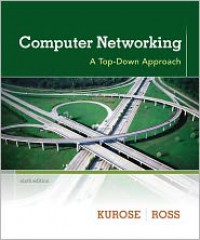 Great form of an introduction to the networking field, perhaps a little too simplified for an IT student, but overtly simplistic enough for someone embarking on the journey down the bit-stream. This might be the books strength, since the harder topics are easily described and easier do not need any real-life translations. The book follows the idea of top-down approach through both ranges of topics discussed and the language used, as the abstraction level is further abstracted to real-life terminology anyone can grasp fast and easily. The lower we get, the deeper in to the secrets of the network and the more technical stuff is discussed. Still, the information is easy to follow since one already must have easily understood the previous topics. Yet if you're into more technical stuff or network management geeky specification stuff this just isn't for you. If you're only a beginner, these almost 780 insight pages may allow you to understand the ideas and cope with most of the tasks network-related. After all, this book makes for a basis of a university/college course.
Great form of an introduction to the networking field, perhaps a little too simplified for an IT student, but overtly simplistic enough for someone embarking on the journey down the bit-stream. This might be the books strength, since the harder topics are easily described and easier do not need any real-life translations. The book follows the idea of top-down approach through both ranges of topics discussed and the language used, as the abstraction level is further abstracted to real-life terminology anyone can grasp fast and easily. The lower we get, the deeper in to the secrets of the network and the more technical stuff is discussed. Still, the information is easy to follow since one already must have easily understood the previous topics. Yet if you're into more technical stuff or network management geeky specification stuff this just isn't for you. If you're only a beginner, these almost 780 insight pages may allow you to understand the ideas and cope with most of the tasks network-related. After all, this book makes for a basis of a university/college course.
Star Wars and History
 Every writer uses his own way of life, his views and knowledge when creating his worlds and his charactrs. Star Wars is no different... The whole saga resembles our history, though it is placed far far away. The heroines are not that dissimilar to humane history women of valor, the imperial rise and fall happened on Earth again and again. Heroes who stand to the overwhelming forces of evil power-holders were present in our history and in the Skywalker's galaxy chronologies. Rebels and their actions - fairly the same. Family arguments, deceits and deceptions, the forces of light and dark side, even enterpreneurs and mobs thriving throughout the crises without any major problems at all - these were all present, if not constantly repeated during the 20th century, then happening permanently throughout our history. Nancy Reagin only chooses to show a few examples showing how the whole Star Wars were scripted after our history, how every creature present in the movie simply follows the lifelines of hundreds of earthlings, how the story twists often unravelled here. Giving many examples and discussing who, why and when allows everyone to see the connection between the little 3rd rock from the sun and the galaxies far far away where many races coexist and spread between stars and worlds of wonder. Great read for SW maniacs, even better for those who simply have seen the movie. Not a very good idea for someone who haven't seen the movie yet... but is there anyone here on this earth who gets close to this book and haven't seen it?
Every writer uses his own way of life, his views and knowledge when creating his worlds and his charactrs. Star Wars is no different... The whole saga resembles our history, though it is placed far far away. The heroines are not that dissimilar to humane history women of valor, the imperial rise and fall happened on Earth again and again. Heroes who stand to the overwhelming forces of evil power-holders were present in our history and in the Skywalker's galaxy chronologies. Rebels and their actions - fairly the same. Family arguments, deceits and deceptions, the forces of light and dark side, even enterpreneurs and mobs thriving throughout the crises without any major problems at all - these were all present, if not constantly repeated during the 20th century, then happening permanently throughout our history. Nancy Reagin only chooses to show a few examples showing how the whole Star Wars were scripted after our history, how every creature present in the movie simply follows the lifelines of hundreds of earthlings, how the story twists often unravelled here. Giving many examples and discussing who, why and when allows everyone to see the connection between the little 3rd rock from the sun and the galaxies far far away where many races coexist and spread between stars and worlds of wonder. Great read for SW maniacs, even better for those who simply have seen the movie. Not a very good idea for someone who haven't seen the movie yet... but is there anyone here on this earth who gets close to this book and haven't seen it?








